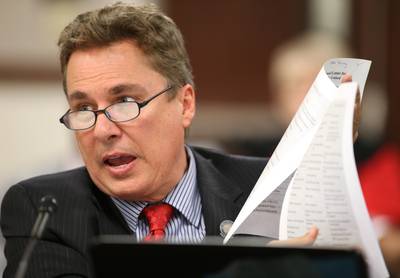
Kindergarten students respond to questions posed by teacher Raeleen Martinez during an interactive story time in their room at Martinez Elementary School on Tuesday, October 7, 2014.
Thursday, April 2, 2015 | 2 a.m.
Before it even started, lawmakers dubbed this year’s Legislature the “Education Session.”
It began when Gov. Brian Sandoval announced in January that he would put more than $400 million into his budget to improve a school system ranked among the worst in the nation. After that, the consensus among many lawmakers was that education would take center stage in Carson City this year.
Despite headline-grabbing debates over allowing guns on campus or loosening the federal government’s grip on state land, that’s stayed true: Legislators have debated education issues covering almost every relevant topic, from charter schools to Common Core.
But now it’s the beginning of April and the Legislature is half over. Here are the biggest developments in education legislation so far:
Districts close to winning funding war
By far the biggest education news so far in the session has been the Legislature’s approval of the school district’s bonding authority. The passage of SB119 allows districts to raise money to build new schools and renovate old ones, both things that CCSD has been desperate to do after years of overcrowding and deteriorating buildings.
The issue was fast-tracked through the Legislature and widely supported by both parties, but there’s still some heavy lifting left.
Sandoval’s proposed tax plan, the economic engine that will drive many of his education programs, barely cleared a committee along party lines earlier this week and is expected to face even tougher opposition in the Senate.
District officials are watching it closely, but are being careful to stay out of the largely partisan debate. They don’t care where the money comes from, as long as they end up getting it.
“We’re just the crying baby in the back of the room,” said CCSD lobbyist Joyce Haldeman. “We don’t care what you feed us, we just want to be fed.”
It’s a different story when it comes to the funding formula that determines how much the state pays to educate each student. Few in the state education scene will be satisfied until school funding is weighted to pay more for schools to educate students who are poor, disabled or learning English. That conversation has yet to begin in earnest.
“This is a do or die moment,” said Ruben Murillo, president of the Nevada State Education Association. “This is really going to be the only opportunity we have in decades to get this right.”
Conservative lawmakers push for increased accountability
While lawmakers are finally sitting down with school administrators to address some of the state’s most pressing education needs, it has come at the price of significant talk about increasing accountability.
Some of the Legislature’s conservative lawmakers are using the calm before the inevitable storm surrounding Sandoval’s budget to push through as much reform as they can.
“I don’t think the school districts anticipated the results of the last election and I think they are concerned about a lot of the changes that we want to make,” said Republican Assemblyman Chris Edwards. “I don’t think that they see the benefits of all the reforms and the improvements that we want to make.”
A flurry of bills introduced in recent weeks would wrest control away from the state’s urban districts in favor of state and local intervention.
The biggest among them is AB448, which would establish a state-run "achievement district" that would convert low-performing schools into charter schools.
Sandoval publicly supported the concept before the session started, and state Superintendent Dale Erquiaga spearheaded it before the Assembly education committee hearing last Friday.
CCSD Superintendent Pat Skorkowsky testified that he wasn’t opposed to the bill in concept, but said that the language was too vague. He said charter organizations that took over a school could get away with dumping the school’s existing students and importing new ones from another neighborhood to skirt accountability.
“There are ways to promote increased numbers of charter schools that are more transparent, organic and accountable than the [Achievement District] method,” said Erin Cranor, president of the Nevada Association of School Boards.
Other accountability bills would allow incorporated cities to break off and form their own school districts.
The anti-Common Core movement makes its final stand
Opponents of the state’s implementation of Common Core standards are hoping to bury the program once and for all.
Led by activist John Eppolito, Nevadans Against Common Core rallied in front of the capitol Wednesday ahead of an afternoon hearing on an Assembly bill to eliminate the standards completely. One of their signs compared the program to communism.
They argue the standards are untested, confusing and constitute a federal takeover of local education. They even got national Common Core opponent Sandra Stotsky to testify before the Assembly by phone. Stotsky helped write the highly acclaimed standards used by Massachusetts before the state switched to Common Core in 2010.
If enacted, the bill would adopt the standards Stotsky wrote.
Karen Gray, a researcher for the conservative Nevada Policy Research Institute, said the standards come with too much baggage in the form of high-stakes testing.
At the same time, proponents of the standards also came out in force, either in person or through written statements. They included college professors, school district officials, a national researcher from the education-oriented Fordham Institute and even the Las Vegas Metro Chamber of Commerce.
“I challenge anyone to point out a single item in these standards that students do not need to learn in order to be competitive in life,” said Allison Serafin, vice president of the Nevada State Board of Education.
Seth Rau of the education think-tank Nevada Succeeds was confident the bill would die in committee.
He said that even though the standards are probably here for another few years, a state review of the Common Core standards in 2017 could be another flashpoint for the debate.
“I don't expect it to just go away overnight,” he said. “[The debate] will be here for a while.”
A related bill would stop school districts from releasing student information to the state for statistical purposes, devastating accountability systems meant to track school performance.


Join the Discussion:
Check this out for a full explanation of our conversion to the LiveFyre commenting system and instructions on how to sign up for an account.
Full comments policy